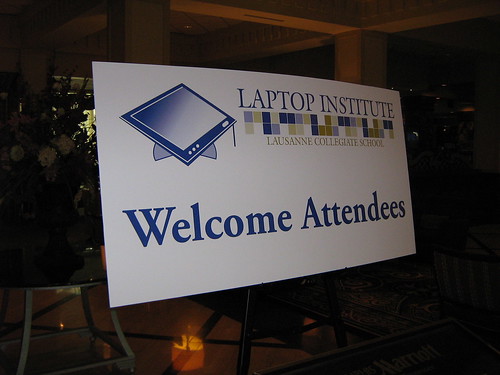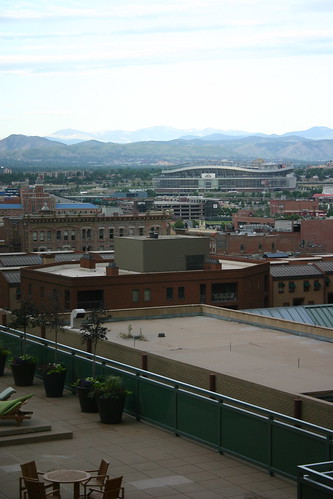After an especially hectic summer in 2010, I had expected that this year could be a relatively quiet year. (Un?)fortunately, that is not shaping up to be the case.
As those of you who follow my sporadic blog posts know, I am currently on sabbatical working on my MEd thesis, a process that marches along. The plan is to do data collection in the next month and a half and then move on to the writing stage. While I will be returning to an as-yet-to-be-determined day job in my District in the fall, it will likely be closer to Christmas before the thesis thing wraps up.
While I have to pass on ISTE this year, July and August will see me on the road to the Midwestern States for two exciting events. My annual pilgrimage to Memphis continues as I am presenting eight different sessions over two days at the Lausanne  Laptop Institute July 10-13. I love this event for many reasons. After all, it’s where my thinking about teaching and learning took a ninety degree turn after being challenged by the ideas of David Warlick six years ago and I have developed and continue to nurture many friendships and professional relationships with educators from all over the world every summer on the banks of the Mississippi. This summer will be particularly exciting for participants as international educator Jeff Utecht from the International School Bangkok – he’s a rockstar in educational technology circles – will be keynoting and leading several sessions as well. If you are looking for a great learning event this summer, this is the one!
Laptop Institute July 10-13. I love this event for many reasons. After all, it’s where my thinking about teaching and learning took a ninety degree turn after being challenged by the ideas of David Warlick six years ago and I have developed and continue to nurture many friendships and professional relationships with educators from all over the world every summer on the banks of the Mississippi. This summer will be particularly exciting for participants as international educator Jeff Utecht from the International School Bangkok – he’s a rockstar in educational technology circles – will be keynoting and leading several sessions as well. If you are looking for a great learning event this summer, this is the one!
In early August I have been invited to participate in a two-day conference at the University School of Milwaukee. While I am not sure if the details are public yet, I am humbled to be invited to stand amongst the quality of the presenters that will be there. I will share the details as they are announced/posted.
Of course, later in August comes “our” turn. After successfully hosting our 1-to-1 Bootcamp for Educators last summer, we’ve changed the name to LearnEast 2.0.11 and tweaked the focus to include a broad range of technology-rich learning sessions. I am excited that noted international educator Kim Cofino of Yokohama International School in Japan has agreed to join us to virtually keynote day two of the event. Preliminary details are available here.
Throw in a week as a member of the host committee for the Pepsi U-19 Men’s Canadian Fastpitch Championships and the summer of 2011 is shaping up to be one of the best ever.

 As I was watching television last night, one of the storylines the commentators were tracking was the emergence of social media and, more specifically, how individuals who “broadcast” election results on Twitter, Facebook or any of the other platforms could be breaking the law. The penalties are severe, with possible fines of up to $25,000.
As I was watching television last night, one of the storylines the commentators were tracking was the emergence of social media and, more specifically, how individuals who “broadcast” election results on Twitter, Facebook or any of the other platforms could be breaking the law. The penalties are severe, with possible fines of up to $25,000.
 There are a couple of exciting options taking place next month. First up is
There are a couple of exciting options taking place next month. First up is  Beginning with a keynote from Canada’s own Dean Shareski, educators will be able to choose from a wonderful selection of sessions delivered by educators from all over the world. These sessions offer practical advise on shifting classroom practice from your colleagues; classroom teachers and educational technology leaders from every continent.
Beginning with a keynote from Canada’s own Dean Shareski, educators will be able to choose from a wonderful selection of sessions delivered by educators from all over the world. These sessions offer practical advise on shifting classroom practice from your colleagues; classroom teachers and educational technology leaders from every continent.
 However, this weekend will be special. Saturday I get to head back to where it all started for me – Memphis, Tennessee and
However, this weekend will be special. Saturday I get to head back to where it all started for me – Memphis, Tennessee and  Later that day I had a chance to talk to Dave on the bus to the hotel and we began a great friendship. From that connection grew a new set of personal ideas about the possibilities for school, connections to other authors and educators, two visits by Dave to my home province where I was so proud to introduce him to my colleagues, my own start in blogging and eventually the journey has led me to where I am today – promoting and supporting change with teachers and students in our schools.
Later that day I had a chance to talk to Dave on the bus to the hotel and we began a great friendship. From that connection grew a new set of personal ideas about the possibilities for school, connections to other authors and educators, two visits by Dave to my home province where I was so proud to introduce him to my colleagues, my own start in blogging and eventually the journey has led me to where I am today – promoting and supporting change with teachers and students in our schools. Birds of a Feather Session – Encouraging Project based Learning
Birds of a Feather Session – Encouraging Project based Learning
